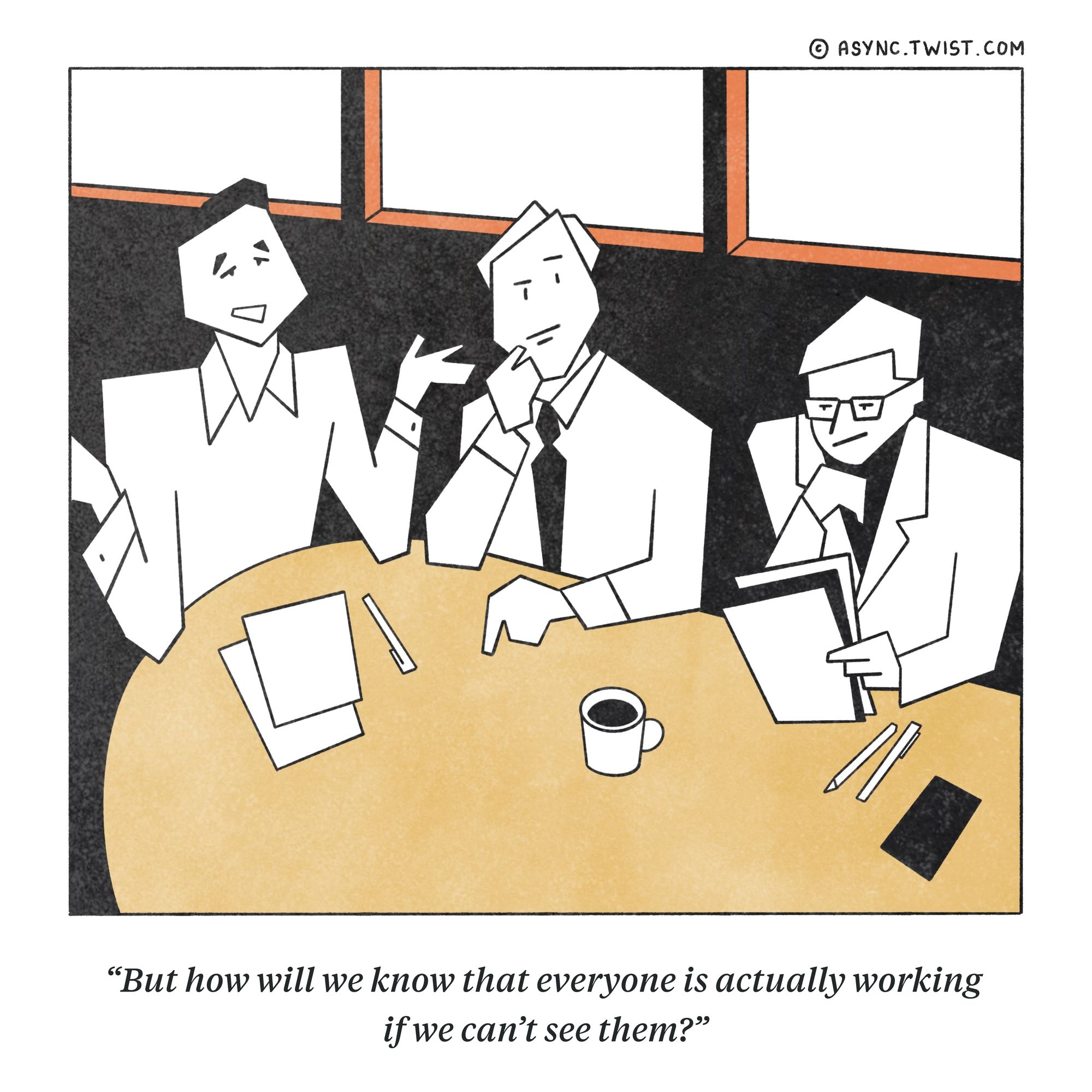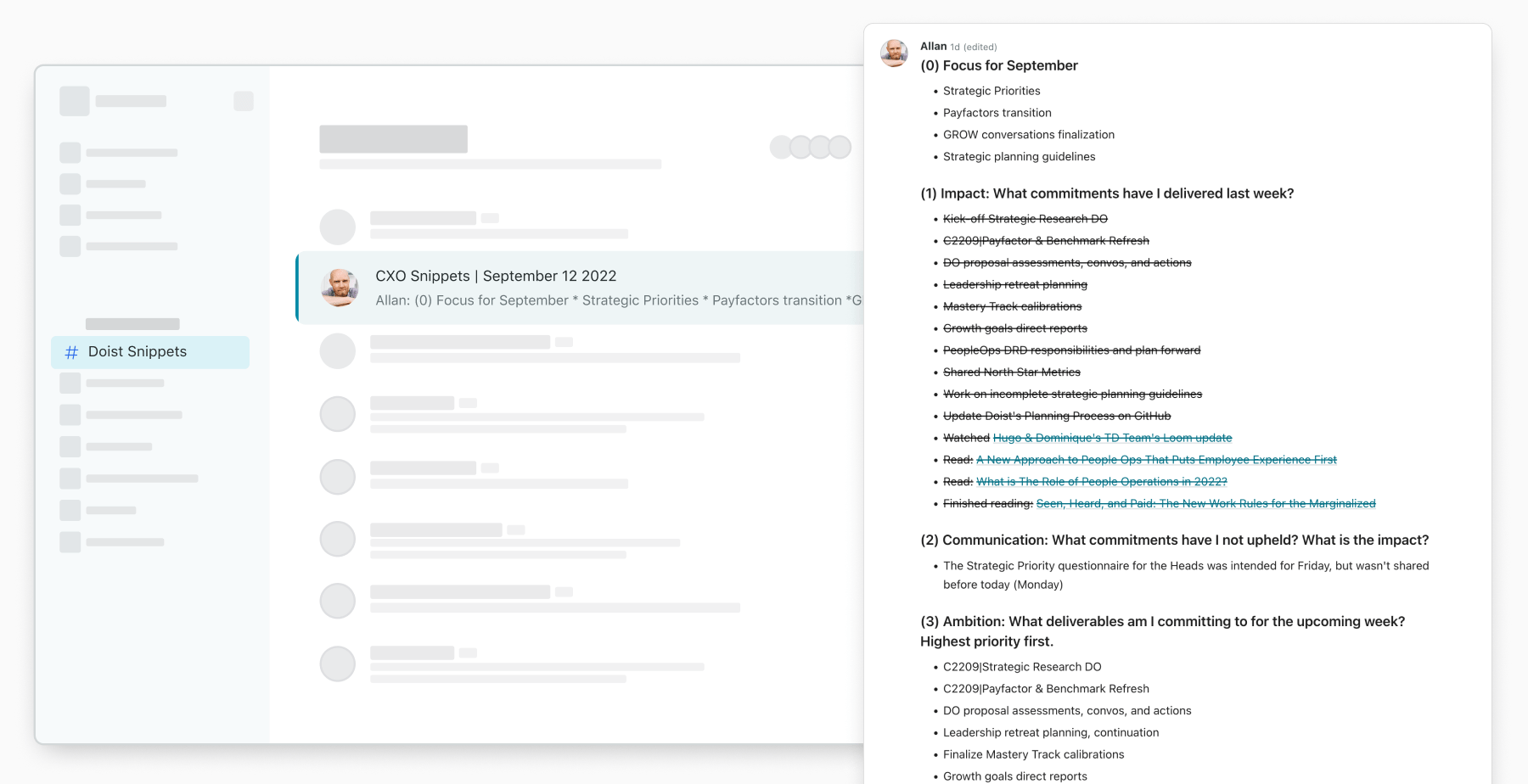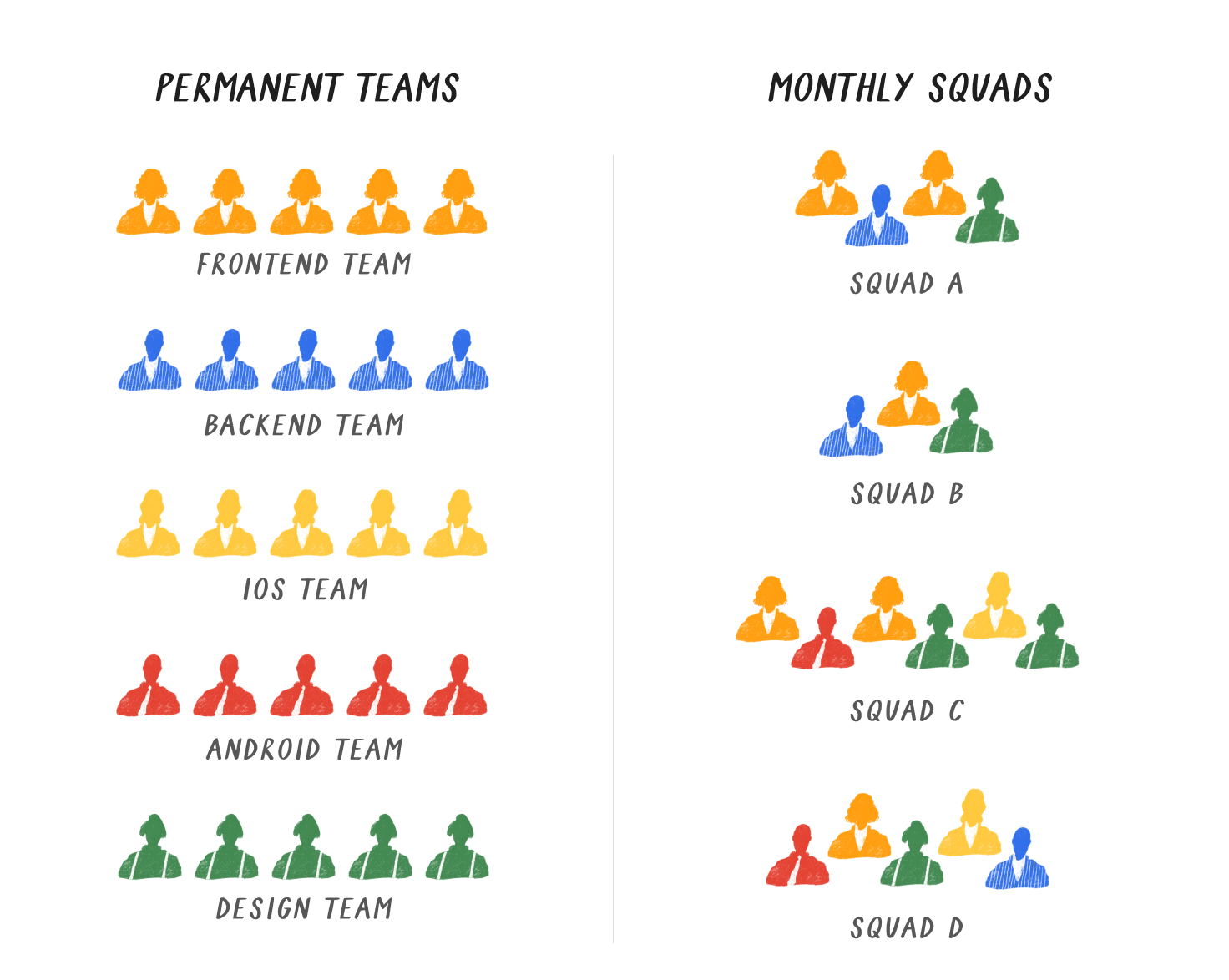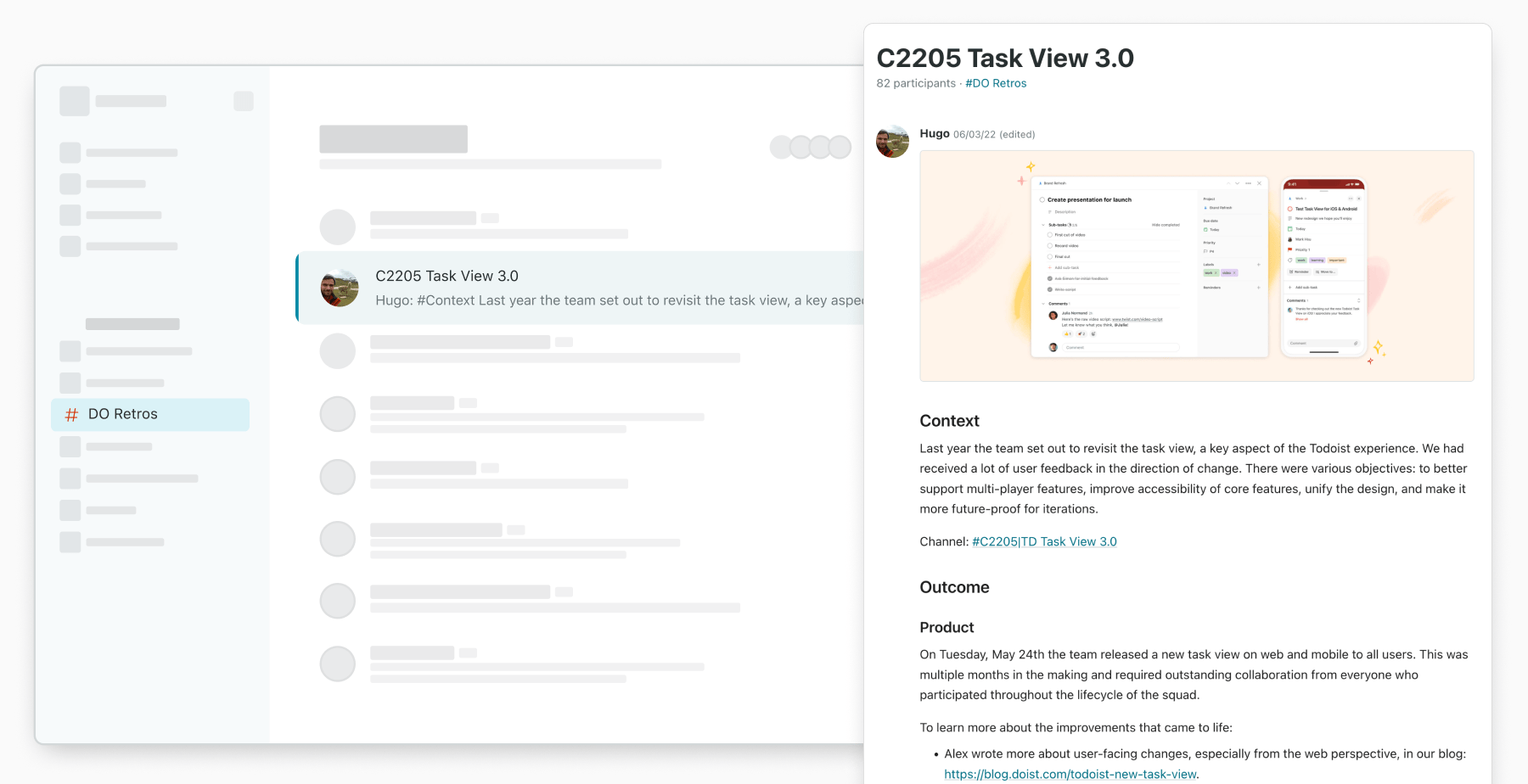3 time-tested systems for creating accountability on a remote team
By Becky Kane

In an office, it’s easy for managers to fall back on presence as a proxy for productivity. The people who are most vocal in meetings, most effective at getting “face time,” most willing to arrive early and leave late, and most able to attend after-hours functions are rewarded over those who keep their heads down and do the work.
Unfortunately, a lot of companies are replicating this type of toxic presenteeism digitally — expecting all-day availability for meetings and immediate (or close to it) responses to messages and emails as a way for workers to prove they aren’t slacking off. (The irony being that constant context switching from work to meetings and messages and back again only makes it harder for people to do their jobs.)
According to a recent survey conducted by Qatalog and GitLab, employees spend "an additional 67 minutes per day on average (on top of their regular working hours) making sure they are visibly online at work, equivalent to more than 5.5 hours each week."
Far from being a barrier to accountability, remote work can be an opportunity to create a more results-oriented culture, focusing on the actual work getting done rather than the performance of work getting done.
Creating results-oriented accountability on a remote team doesn’t have to be complicated or burdensome – and it certainly doesn’t require invasive surveillance software.
Over the last decade at Doist, we’ve established three systems of accountability that have allowed us to thrive as a fully remote, async-first team of ~100 employees spread across fifteen time zones:
Weekly snippets

Snippets started way back in the early days of Google as a way to scale teamwork without getting bogged down in cumbersome reports or disruptive standup meetings.
At the beginning of the week, each member of the team would list out what they had accomplished the week before and what they were planning to accomplish in the coming week. Those individual snippets would then be combined into a single update and sent out to the whole team.
At Doist, we’ve evolved the concept into a shared team ritual not just for reporting but for reflecting, prioritizing, learning, and connecting. Each Monday morning, an automated Twist thread prompts each team member with a version of the following template based on our core values (each team has their own take on snippets):
- Focus for month
- Impact: What commitments have I delivered last week?
- Communication: What commitments have I not upheld? What is the impact?
- Ambition: What deliverables am I committing to for the upcoming week? Highest priority first.
- Mastery: What lessons am I taking into the next week?
- Balance: What has impacted my well-being, positively or negatively, last week?
Snippet templates are infinitely adaptable to your company’s values and workflows. For example, if your team uses OKRs for goal-setting, your snippet template could include a place for OKRs to keep them top-of-mind as people evaluate the past week and prepare for the one to come.
They’re a lightweight way to not only create results-oriented accountability, but also team-wide transparency. Everyone can get an overview of what everyone else is working on — from the CEO to the newest team member — and spot projects they want to know more about. These threads often turn into a space for teams to celebrate wins, troubleshoot issues, and ask questions about work that’s happening elsewhere in the team.
An added benefit of posting weekly snippets? They help managers review work that has been done over an extended period of time. When it comes time for regular performance reviews (or your company's equivalent) a manager already has a log of everything their teammate has worked on…without having to rely on their brain to remember it all.
All snippets are posted in asynchronous Twist threads so everyone can catch up and add comments on their own schedules.
Small, autonomous squads with clear objectives
You can’t hold people accountable without clear expectations and the resources to meet them. That’s where our DO system (short for Doist Objectives) comes in.

Inspired by workflows from Spotify and Basecamp, the DO system is how we match company-wide priorities with the resources to accomplish them. Each DO squad has 1-5 members with a clear objective and all the resources they need to complete the work without getting blocked by external dependencies. Depending on the objective, DO cycles can last anywhere from one month to six.
The key to the system is to keep teams small and autonomous — the bigger the team, the more likely you are to encounter the free rider problem and the easier it is for issues to fly under the radar. (As an added benefit, small teams also cut down on the communication overhead of too many cooks in the kitchen.)
At the end of each month of work, squads share their “3Ls” — what they liked, lacked, and learned — in order to uncover strengths and weaknesses of the squads and course correct as needed.
At the conclusion of each DO project, the squad opens up an async retrospective thread in Twist where everyone can reflect on what was accomplished, what went well, and what could have been done better. It’s yet another way for everyone on the team to hold each other accountable, with a focus on learning and growth rather than blame and punishment.

You can read more about the DO system in detail here. It isn’t perfect —we’re constantly iterating on it —but it has succeeded in creating clarity and accountability company-wide as we’ve scaled.
In such small teams with clear timelines and scopes of work, it doesn’t go unnoticed if someone:
- Misses weekly or mid-project milestones
- Blocks other team members from moving forward
- Doesn’t respond within 24 hours to Twist messages they’ve been tagged in
- Fails to provide weekly progress reports on their work
- Continuously pushes the same work from one week to the next
None of these are grounds for punishment in and of themselves, but they are areas of concern that managers should address. Which brings us to the last piece in our accountability system…
Regular 1:1s
At Doist, every person has a regular 1:1 with their direct manager. The cadence varies from weekly to monthly depending on personal preference.
These 1:1s are an opportunity to build rapport and mutual trust, but also to address problems, ask questions, provide radical candor (in both directions!), follow up on areas for growth, and hold teammates accountable to the goals they’ve set out for themselves. Document the things you talk about in a shared space (we use 1:1 Todoist projects), so that you can both follow up in the future.
For example, I wanted to do a better job of communicating my work to the team, but writing out a quarterly update always fell to the bottom of my to-do list. I mentioned it to my boss, Brenna, and we added a recurring task in our 1:1 Todoist project so she can keep me accountable for posting it.
Too often, leaders think of accountability as top-down enforcement, but the most powerful forms of accountability are a dialogue where employees are active participants in identifying how they want to grow and the challenges they want to take on. The most effective managers — remote or otherwise — approach their role as coaches giving high-level direction, trouble-shooting roadblocks, and investing in their team members’ growth, rather than referees keeping score and enforcing the rules.
Employees want clear expectations along with support and accountability for growth. 1:1s are an indispensable tool for remote managers to provide it.
Bonus: Document clear expectations around response times
If you’re serious about building a more focused and asynchronous culture on your team, you need to let employees know in no uncertain terms that it’s ok — and actively encouraged — to not respond right away.
For example, in a regular week (no holidays or vacation), we expect people to respond to new Twist comments and messages within 24 hours — even if the response is just “Saw this and I’ll think about it and get back to you by Wednesday”.
We’ve found that 24 hours provides ample time for everyone to set their own hours and create uninterrupted blocks of time for deep work regardless of time zone without slowing work down.
Documenting clear expectations around response times provides a standard everyone can be held to without requiring people to “prove” themselves by responding ASAP to every message.
Bonus bonus: Always include a deadline up front
Tasks with open-ended timelines are the easiest to put off in favor of more urgent work. Whenever you request something from someone, always include a deadline upfront (e.g., "Does this coming Wed work for a deadline?").
With a clear timeline, the other person can assess their workload and either agree to it, say no, or propose a new due date that does work. (Accountability without the ability to push back and say "no" is a recipe for overwhelm and burnout.) Setting a mutually agreed upon due date sets clear expectations from the start, helps everyone plan and prioritize, and creates a standard people can be held to.
A culture of accountability doesn't mean meeting 100% of deadlines at all costs — humans are notoriously terrible at estimating how long a task will take — but it does mean always following up as soon as you know you'll miss a deadline so the other person can plan accordingly.
Snippets, DOs, and 1:1s are the systems that have worked for us when it comes to creating a culture of accountability remotely. Your team may need something different, but I hope the thinking behind them sparks ideas for how you can move your team toward accountability that focuses on what your people are actually accomplishing rather than the hours they spend working.
3 links worth sharing
- Quartz at Work's Best Companies for Remote Workers 2022! This is our 2nd year partnering with Quartz to recognize the companies at the forefront of a remote-first future. It's very cool to see the way that teams of all sizes are finding new and innovative ways to help their remote workforce thrive.
- The Office is Dying. It's Time to Rethink How We Work. A timely episode of The Ezra Klein podcast with journalists Anne Helen Petersen and Charlie Warzel. It's one of the most thoughtful conversations about the "future of work" I've heard. This is a long one but worth the listen.
- Slack regrets the "green dot".
“I still regret that we added the green dot,” Rayl [senior vice president of product] says. “I never wanted to add the green dot. I think the green dot is very harmful.”
